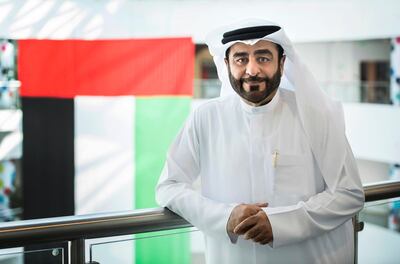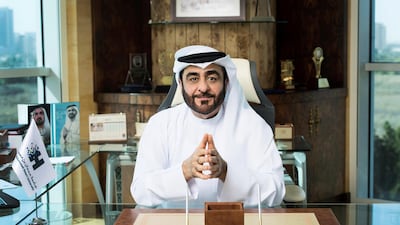A forward-thinking Dubai university has helped tens of thousands of teachers across the world embrace the switch to digital learning since the Covid-19 pandemic began.
Hamdan bin Mohammed Smart University was better placed than most to adapt to a new era of education when the virus spread all over the globe, forcing in-person lessons to move online.
The UAE's first accredited smart university, already heavily focused on digital innovation and preparing pupils for the hi-tech jobs of the future, devised online crash courses to tutor teachers which sparked massive interest overseas.
The university partnered with the Ministry of Education in March to ensure students were covered and teachers had the skills required.
The free courses, How to Become an Online Tutor in 24 Hours and Design an Online Course in 24 Hours" were a runaway success.
“When you see the statistics you remember that more than a billion children have been left behind because of school closures in the pandemic and you realise how important it is that we had technology in place,” said Mansoor Al Awar, chancellor of the university, which was established in 2002.
“Our pledge is to help wherever needed.”
Registrations for the online teaching sessions quickly jumped to 60,000 with courses offered in Arabic, English, French, Spanish and Russian.
Registrations have since crossed 350,000 in more than 100 countries.
The university joined Unesco's Global Education Coalition to support countries to reach distance learning to students who are most at risk.
HBMSU also organises free online seminars in the field of education.
Mr Al Awar highlighted the importance of using smart learning tools to keep students engaged so they are proactive in their own learning.

“You can control students easily when they are in front of you. In a class you deal with one size fits all. But the role of the teacher has become totally different,” he said.
“There are challenges because smart learning is distance education but not all distance education is smart.”
Strong course content can keep students energised.
The teacher takes on the role of a mentor who adapts the curriculum based on regular assessment of the student.
The path to a fully online university offering live classes and independent learning has not been easy.
When the university launched, authorities recommended a blended approach as they believed a complete transition to online would be too drastic for students.
The bachelor’s degree was among the courses that had a mixture of online and a traditional face-to-face component until recently.
“We were told the generation at that time, 15 years ago, needed a transitional, preparation period,” Mr Al Awar said.
“But things have evolved and the young have more command on technology than ever before.
“Even before Covid, we have been asking to be released from that particular condition.”
The pandemic helped authorities understand the strength of an online curriculum and all programmes at the university are currently online.
The university has Sheikh Hamdan bin Mohammed, the Crown Prince of Dubai, as its president and is committed to spreading a culture of research through smart learning in the Arab world.
Mr Al Awar believes not just in book knowledge but acquiring skills with smart learning as the key to the future.
“The pandemic has opened the eyes of society to this university,” he said.
Mr Al Awar wants to place no limits on the ambitions of its learners and encourages an entrepreneurial spirit among its students.
"We are intent on introducing into society entrepreneurs and not job seekers," he said.
“We care about excellence, learning and skills. HBMSU has a philosophy of transferring both knowledge and skills not like most educational institutions that rely only on the knowledge component.”
Several batches of students have been inspired by the university’s push to set aside traditional aspirations for jobs with the government or a multinational company and instead turn into entrepreneurs and create employment.
The university tracked the professional life of 83 Emirati postgraduates, some since 2012, who had government jobs. They went on to set up their own firms and now plan to set up a venture capital fund for other HBMSU graduates.
“They were not from rich families and they all had government jobs,” Mr Al Awar said.
“We followed up with them after graduation, each of them acquired a trading licence and two years after they quit their government jobs, they started their own business.”
"They are the real models and have set the path for our newcomers," he said.
“That is what we are aiming at. We are trying to shift the paradigm. It may take one more generation for more to happen.”
Apart from being comfortable with technology, students are encouraged to think analytically, come up with innovative ideas, communicate and work as a team.











